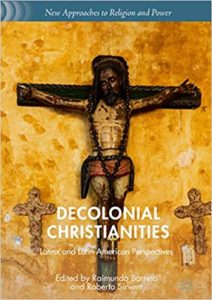Decolonial Christianities makes a critical and constructive contribution to the decolonial turn within Christian theology. In the introduction, the editors explain how the text is organized around a central question: “what can be gained from making explicit (i.e. theoretical connections between decolonial thought and Christian theology) what is already implicit (i.e. decolonial praxis found in many Latinx, Latin American, and Indigenous communities)?” (3).
The book opens with Part I: Focal Essays, which contains three chapters written by senior scholars: Enrique Dussel, Luis N. Rivera-Pagán, and Sylvia Marcos. Part I provides an overarching framework by identifying some of the challenges decolonial theologians must address. Eleven scholars, working across disciplines and throughout the Americas, respond to the Focal Essays. The editors then group Chapters 6-15 into four parts.
Part II: Indigenous Dreams, Indigenous Resistance exhibits a historical focus on colonial Mexico. It begins with Jennifer Scheper Hughes’ chapter which traces the Indigenous roots of Mexican Catholicism. Scheper Hughes’ analysis of the Map of Teozacoalco (1580) highlights how Indigenous mapmakers helped save colonial Christianity. Along similar lines, Verónica A. Gutiérrez questions the idea of a static imposition of medieval Catholicism in Mesoamerica. Gutiérrez demonstrates how the Nahuas (or Aztecs) resisted spiritual colonization by imbedding Mexican Catholicism with indigenous spiritual practices, a process she calls the “Nahuatilization of Christianity.” Michel Andraos examines the origins of the iglesia autónoma in the city of San Cristóbal de Las Casas, Chiapas, Mexico. According to Andraos, the formation of the iglesia autónoma demonstrates how “decolonial spaces” existed, and more importantly, can continue to exist within hegemonic ecclesial structures. Néstor Medina identifies a decolonial epistemic impetus in the historical records of Indigenous communities in Guatemala and Canada. Ultimately, Medina challenges Latinx theologians to employ similar methodologies to theorize lived religion.
Part III: Decolonial Politics and Theological Possibilities includes chapters with a theoretical emphasis. It begins with An Yountae who explores the role between cosmopolitanism and imperial Christianity in the formation of the modern human. Engaging with Afro-Caribbean philosophy, An recasts cosmopolitanism as a humanizing project that can be inspired by eschatological visions of a world beyond the logic of empire. Matilde Moros considers the decolonial dimensions of Marcella Althaus-Reid’s thought and its implications for the study of sexuality and religion. While critiquing Althaus-Reid’s narrow grasp of race in the history of sexuality in Latin America, Moros advocates for a decolonial “indecent theology” that can help recover women’s sexual genealogies.
Ángel F. Méndez Montoya develops a queer political theology of public space in light of the current debates regarding same-sex marriage in Mexico. Méndez Montoya advances a political imagination that empowers social movements and creates a radically inclusive society for all sexual and racial minorities. Nicolás Panotto promotes a methodological shift within Latin American Liberation Theologies that rejects an Absolute Liberating Entity as the basis for knowledge of God. Highlighting the benefits of decolonial theory, Panotto calls for a “theopoetic” shift that allows theological visions to emerge from alternative epistemes, rather than remain constrained by institutionalized ideas about divine presence in the world.
Part IV: Decolonial Ecclesiologies focuses on praxis in Latin American faith communities. Elizabeth O’Donnell Gandolfo considers the significance of Salvadorian Ecclesial Base Communities, or comunidades eclesiales de base (CEBs), in producing knowledge and historical subjectivity among its members. According to O’Donnell Gandolfo, CEB’s embody a decolonial epistemology that reminds Latinx and Latin American theologians that decolonization remains an unfinished project.
Ann Hidalgo analyzes the Roman Catholic “liturgies of repentance,” which were issued as a response to the legacy of colonial violence enacted on Afro-Brazilian and Indigenous peoples. Hidalgo considers such liturgies, spearheaded by Brazilian Bishop Casaldáliga in the 70s and 80s, to be acts of penitence and repair that have transformative potential for the church. Through such tangible acts of solidarity, Hidalgo suggests, the Roman Catholic Church has the opportunity to recast itself as a decolonial ally in our present moment.
The book ends with Part V: A Decolonial Prayer, in which Cláudio Carvalhaes tries to connect several of the dominant themes discussed throughout the book. Carvalhaes concludes by asking how (and whether) decolonial faith is a real possibility given the ties that bind the church and empire in the modern/colonial world.
Decolonial Christianities brings renewed attention to Latinx and Latin American scholarship, particularly the critical interventions in Decolonizing Epistemologies: Latina/o Theology and Philosophy (2012). However, this text expands the conversation by incorporating new scholarly voices across the Americas. By engaging a wide range of fields, the contributors also highlight the benefits of inter- and trans- disciplinary approaches for theological inquiry. Ultimately, Decolonial Christianities has the potential for a far-reaching impact in the areas of Church History, Christian theology, World Christianity, Latinx/Latin American studies and beyond. As the editors explain, “one aspires for the promises of further and more systemic explorations of such conversations, which are still far from occupying a more significant place as a meaningful analytical tool and conversation partner in theological seminaries and churches where Christian theology is dominantly produced” (9). If such promises are to materialize, this text should play an important part in mapping the way forward.
Southern Methodist University, Perkins School of Theology




